Glaucoma, Genes & Me - UCL Public Engagement Event
Programme Highlights and Summary
 In August 2006, Paul Foster and Sancy Low started research into a genetic study of primary angle-closure glaucoma (PACG), involving over 80 families from the UK. A public engagement event was held on 22nd September 2009 at the UCL Anatomy Building to bring together the research participants, genealogy volunteers, charitable sponsors, and experts in the field of PACG. This event was put together by the PACG research team at Moorfields Eye Hospital and UCL Institute of Ophthalmology. A wide range of topics related to angle-closure were discussed at this one-day event, with emphasis on the areas of most importance to PACG patients and their families.
In August 2006, Paul Foster and Sancy Low started research into a genetic study of primary angle-closure glaucoma (PACG), involving over 80 families from the UK. A public engagement event was held on 22nd September 2009 at the UCL Anatomy Building to bring together the research participants, genealogy volunteers, charitable sponsors, and experts in the field of PACG. This event was put together by the PACG research team at Moorfields Eye Hospital and UCL Institute of Ophthalmology. A wide range of topics related to angle-closure were discussed at this one-day event, with emphasis on the areas of most importance to PACG patients and their families.
Session 1: Introduction
The day’s event started with a session was chaired by Paul Foster, who gave an account of the history of genetics from Darwin and Mendel to the discovery of DNA by Watson and Crick. Gus Gazzard and Sancy Low continued the introductory session with a lecture on primary angle-closure glaucoma and its inheritance respectively.
Session 2: Sharing experiences
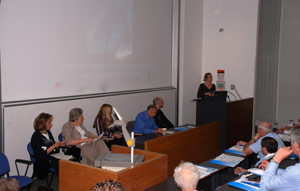 This session involved numerous speakers re-visiting their experiences as patients with the condition, or their involvement in the family history research. One patient said it had taken him three months to learn how to instill his glaucoma drops, and many fellow patients approached him afterward to say they had similar difficulties. Another patient whose family members have also been screened and found to have the condition, described her own diagnosis, and how she helped the researchers by writing to distant family members to find out if any are any other glaucoma sufferers, and for them to participate in the project. Two representatives; Russell Young and Faanya Rose from the charities IGA and Fight for Sight respectively, discussed the work they do and how they hope it will help to raise funds for projects that help prevent and treat blindness from eye diseases.
This session involved numerous speakers re-visiting their experiences as patients with the condition, or their involvement in the family history research. One patient said it had taken him three months to learn how to instill his glaucoma drops, and many fellow patients approached him afterward to say they had similar difficulties. Another patient whose family members have also been screened and found to have the condition, described her own diagnosis, and how she helped the researchers by writing to distant family members to find out if any are any other glaucoma sufferers, and for them to participate in the project. Two representatives; Russell Young and Faanya Rose from the charities IGA and Fight for Sight respectively, discussed the work they do and how they hope it will help to raise funds for projects that help prevent and treat blindness from eye diseases.
Participant Representatives






Session 3: Group discussion
-
Better treatment for ACG
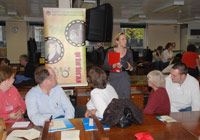 Winifred Nolan chaired this part of the session and gave a summary of current treatments and their aims. Laser iridotomy is the first line treatment. Patients discussed their opinions on laser iridotomy, they felt it was not an unpleasant treatment and was better than expected for most patients. An alternative treatment is lens extraction which has been increasingly performed. A few patients had this treatment, and in hindsight felt they might have considered having an iridotomy first. A lot of interest was received on methods to instill eye drops, and excellent suggestions such as having a video loop on methods that worked for different patients in using their drops could be played in the clinic waiting rooms.
Winifred Nolan chaired this part of the session and gave a summary of current treatments and their aims. Laser iridotomy is the first line treatment. Patients discussed their opinions on laser iridotomy, they felt it was not an unpleasant treatment and was better than expected for most patients. An alternative treatment is lens extraction which has been increasingly performed. A few patients had this treatment, and in hindsight felt they might have considered having an iridotomy first. A lot of interest was received on methods to instill eye drops, and excellent suggestions such as having a video loop on methods that worked for different patients in using their drops could be played in the clinic waiting rooms. -
Quality of Life
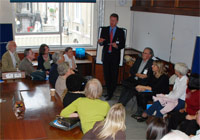 Paul Foster introduced this part of the session by asking how the diagnosis affected the participants and their families, including any psychological impact. Most feedback was received on the prescribed eye drops, where side effects from timolol and pilocarpine were mentioned most. Patients also explained their anxiety related to the condition, they valued being given information and were relieved to be given a diagnosis.
Paul Foster introduced this part of the session by asking how the diagnosis affected the participants and their families, including any psychological impact. Most feedback was received on the prescribed eye drops, where side effects from timolol and pilocarpine were mentioned most. Patients also explained their anxiety related to the condition, they valued being given information and were relieved to be given a diagnosis. -
Early Diagnosis
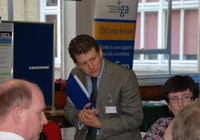 Gus Gazzard chaired this part of the session to discuss diagnosis including any delay which may have taken place and who the diagnosis was made by (Optician, GP, or A&E). The over-riding consensus was that more education was needed for all above parties, as well as patients and their family members on the condition.
Gus Gazzard chaired this part of the session to discuss diagnosis including any delay which may have taken place and who the diagnosis was made by (Optician, GP, or A&E). The over-riding consensus was that more education was needed for all above parties, as well as patients and their family members on the condition. -
Genetics and Family History
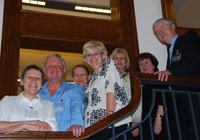 Geoff Swinfield led this discussion in genealogy and many participants said that they had no previous experience in finding family history information. The group discussed whether they would consider taking part in genealogy research for medical or non-medical reasons, and many participants felt they would be prepared to write to distant relatives and invite them to take part in the project. This is most relevant to people with very strong family histories of disease (multiple people affected).
Geoff Swinfield led this discussion in genealogy and many participants said that they had no previous experience in finding family history information. The group discussed whether they would consider taking part in genealogy research for medical or non-medical reasons, and many participants felt they would be prepared to write to distant relatives and invite them to take part in the project. This is most relevant to people with very strong family histories of disease (multiple people affected). -
Extended Family Group
 Sancy Low and Diana Bouglas spoke to participants where large family groups have taken part in the project. Four out of six extended families were in attendance on the day and were updated on the number of blood samples and patient participation statistics. Various participants were given the chance to share their experiences of being involved in contacting extended family members or being contacted themselves.
Sancy Low and Diana Bouglas spoke to participants where large family groups have taken part in the project. Four out of six extended families were in attendance on the day and were updated on the number of blood samples and patient participation statistics. Various participants were given the chance to share their experiences of being involved in contacting extended family members or being contacted themselves.
Session 4: Summary of group discussion session and pre-event questionnaire
Paul Foster summarised the findings of the group discussion above.
In the pre-event questionnaire, we asked our participants to tell us what was most important to them as a PACG patient, and what direction of research they would like to see. The highest ranking answers were: (1) Screening and (2) access to treatment for potential sufferers. The research directions they were most supportive of were (1) accurate diagnosis through education, and (2) support for genetics research.
Session 5: Evening lecture - Glaucoma, Genes & Me
Geoff Swinfield & Sancy Low brought the event to an end by giving attendees a short lecture into the work they do. Geoff Swinfield discussed how to go about tracing a family tree and the available resources in order to achieve this. Sancy Low talked about her project into the genetics of PACG and the main findings to date.
We thank our participants for their very positive feedback on the day:
"Well organised"
"Excellent occasion"
"Informative. Enjoyed meeting other people and the enthusiasm of team."
"Enjoyed event very much!"
"Grateful to have been treated at Moorfields"
"Particularly appreciated the experts & charity effort and support"
This event was made possible by the Beacon Bursary award from UCL Public Engagement Unit
We thank our sponsors for making this event a success:




